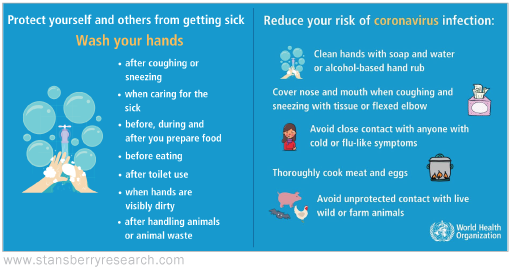I'm going to save you a lot of time and worry: Probiotics will not save you from the coronavirus.
There's a ton of worry about the new coronavirus, officially known as COVID-19. All over the news, we're told to wash our hands, avoid crowds, and stay home when you're sick. Here at our office in Baltimore, there are signs in the kitchens telling folks how to reduce their risk of catching coronavirus...
And while these are good, common-sense guidelines, some folks will take it too far. You can't make your own hand sanitizer from vodka. You can't gargle with bleach to kill the virus (you might kill yourself instead). And you can't amp up your immune system with probiotics to protect you.
A new study came to our attention regarding all the misleading claims about probiotics, and in this chaotic state of misinformation, we need to address it. This way you can see more on how we "trust but verify."
Let's start with what probiotics really are...
Probiotics are the healthy, beneficial bacteria available in pills or in some foods (like yogurt, kimchi, kombucha, and sauerkraut). These bacteria are similar to the healthy bacteria already lining our colons. Probiotics help you better absorb nutrients and give your immune system a big boost.
Sometimes, illnesses wipe out your healthy bacteria, or you might not be getting enough bacteria in the first place if you don't eat a balanced diet. Taking probiotics brings bacteria into your colon, helping to restore the correct balance of bugs.
But there are some gaps in this information. That's where a group of researchers from Belgium and the U.K. come in. They published a paper earlier this year that looked at misinformation. They Googled "probiotics" and then ranked the top 150 hits for accuracy and basis in fact. What's more, they included that any information on probiotics should include these caveats:
- Benefits of probiotics need more research
- Scientific papers citations
- Potential side effects
- Regulatory provisions
They're right. There is a lack of research. Probiotics aren't medications, so they aren't subject to oversight from the Food and Drug Administration ("FDA"). That means there's little regulation. I've talked to plenty of doctors who agree they may be beneficial, but usually just for a certain population, such as folks coming off of an antibiotic treatment.
I'm still a proponent of probiotics, but only if you're having other health problems. If you remember, our friend Dr. Param Dedhia explained his reasoning this way:
I get asked all the time about probiotics and if I prescribe them to everyone. I don't believe that they are helpful for all people. In my years of practice, I recommend probiotics when I put someone on an aggressive course of antibiotics, if someone has infectious diarrhea, or for a person [who] is struggling with food allergies.
For that last group, that means people who experience frequent belching, bloating, or cramping. Of these, I would estimate that anywhere from a third to half the people note some benefit with probiotics. Like Doc, I always seek food-based solutions first.
Probiotics do cause some side effects, though they are usually temporary. Think of it as an adjustment period in your gut. You might feel bloating, gas, or sometimes constipation. And because these are live bacteria, if you are prone to any infections, you should talk to your doctor to see if this is a good option.
Another often-overlooked side effect? Probiotics both in pills and in food form sometimes contain histamines. If this sounds familiar, it's because many seasonal allergy sufferers have to take antihistamines to stop the wheezing, sneezing, and congestion. So, there is a small chance that these foods and pills could trigger your seasonal allergies, including triggering headaches. (Remember, some migraines are triggered by allergies!)
And before you write in and ask about sources, here's a good literature review on probiotics. It concludes that they do show benefits, though we sorely need more research.
This brings me to my last point... When new research comes out, it doesn't get nearly enough attention.
A recent example of this comes from an Iranian study published in Nutrition. The researchers conducted a double-blind randomized clinical trial on folks with depression. Remember, this is the gold-standard trial design for medical research.
They found that folks who took the probiotics (instead of those on the placebo) for eight weeks had improvement in their symptoms. Even better, their inflammation markers dropped, meaning their overall health improved as well.
One reason why this worked: These same bugs that keep us regular also help make our mood-regulating hormone, serotonin. About 90% of serotonin comes from your gut.
For me, the key here is the inflammation. Reducing chronic inflammation drops your risk of heart disease, diabetes, and more. Even if you aren't in a group that would benefit from taking probiotic pills every day, consider increasing your food intake. Do what I do and enjoy some plain yogurt every morning with berries for a healthy start to your day.
What We're Reading...
- More sources cited: The depression study and the Belgian-U.K. study.
- Something different: The Fed will cut rates soon. But should they?
Here's to our health, wealth, and a great retirement,
Dr. David Eifrig and the Health & Wealth Bulletin Research Team
March 10, 2020

